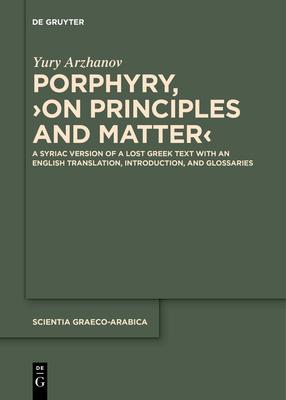The Syriac treatise published in the present volume is in many respects a unique text. Though it has been preserved anonymously, there remains little doubt that it belongs to Porphyry of Tyre. Accordingly, it enlarges our knowledge of the views of the most famous disciple of Plotinus. The text is an important witness to Platonist discussions on First Principles and on Plato's concept of Prime Matter in the Timaeus. It contains extensive quotations from Atticus, Severus, and Boethus. This text thus provides us with new textual witnesses to these philosophers, whose legacy remains very poorly attested and little known. Additionally, the treatise is a rare example of a Platonist work preserved in the Syriac language. The Syriac reception of Plato and Platonic teachings has left rather sparse textual traces, and the question of what precisely Syriac Christians knew about Plato and his philosophy remains a debated issue. The treatise provides evidence for the close acquaintance of Syriac scholars with Platonic cosmology and with philosophical commentaries on Plato's Timaeus.

Porphyry, >On Principles and Matter: A Syriac Version of a Lost Greek Text with an English Translation, Introduction, and Glossaries
The Syriac treatise published in the present volume is in many respects a unique text. Though it has been preserved anonymously, there remains little doubt that it belongs to Porphyry of Tyre. Accordingly, it enlarges our knowledge of the views of the most famous disciple of Plotinus. The text is an important witness to Platonist discussions on First Principles and on Plato's concept of Prime Matter in the Timaeus. It contains extensive quotations from Atticus, Severus, and Boethus. This text thus provides us with new textual witnesses to these philosophers, whose legacy remains very poorly attested and little known. Additionally, the treatise is a rare example of a Platonist work preserved in the Syriac language. The Syriac reception of Plato and Platonic teachings has left rather sparse textual traces, and the question of what precisely Syriac Christians knew about Plato and his philosophy remains a debated issue. The treatise provides evidence for the close acquaintance of Syriac scholars with Platonic cosmology and with philosophical commentaries on Plato's Timaeus.